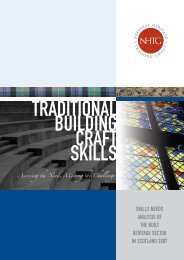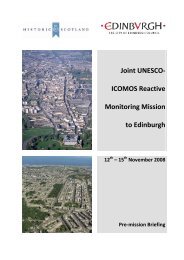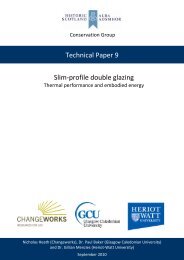The Antonine Wall Management Plan 2013-18 - Glasgow City Council
The Antonine Wall Management Plan 2013-18 - Glasgow City Council
The Antonine Wall Management Plan 2013-18 - Glasgow City Council
You also want an ePaper? Increase the reach of your titles
YUMPU automatically turns print PDFs into web optimized ePapers that Google loves.
Chapter eight<br />
Managing the World<br />
Heritage Site<br />
8.1 This section sets out the roles and responsibilities<br />
of those involved in the management of the<br />
<strong>Antonine</strong> <strong>Wall</strong> WHS including the UK and<br />
Scottish Governments, the Partners who take<br />
an active role in day-to-day management, and<br />
the diverse range of stakeholders who have an<br />
interest in the Site. A governance model for the<br />
<strong>Antonine</strong> <strong>Wall</strong> is available at Appendix G.<br />
8.2 <strong>The</strong> process of developing a <strong>Management</strong> <strong>Plan</strong><br />
involves bringing together all key Partners and<br />
stakeholders to agree a common vision for the<br />
future of the Site. <strong>The</strong> implementation of the<br />
<strong>Management</strong> <strong>Plan</strong> then relies on the effective<br />
co-operation and commitment of Partners and<br />
other key stakeholders to take actions forward.<br />
8.3 All management roles are delivered within<br />
a clear management structure and context,<br />
defined internationally by UNESCO and refined<br />
at local level.<br />
State Party<br />
8.4 State Parties are countries which have ratified<br />
the UNESCO World Heritage Convention. Since<br />
International Treaties are reserved under the<br />
Scotland Act 1998 the UK government is State<br />
Party to the Convention. <strong>The</strong> Department of<br />
Culture, Media and Sport (DCMS) is responsible<br />
for the UK’s overall policy on World Heritage<br />
Sites but since management of the historic<br />
environment is devolved, Scottish Ministers<br />
are responsible for selecting Scottish sites for<br />
nomination, for ensuring that World Heritage<br />
Sites in Scotland are well managed, and that<br />
the Outstanding Universal Value of each Site<br />
is protected. In Scotland, Historic Scotland<br />
undertakes that role on their behalf.<br />
FREWHS International Partners<br />
8.5 As a serial transnational World Heritage Site,<br />
the FREWHS presently includes Partners in<br />
Scotland, England and Germany. <strong>The</strong> number<br />
of international Partners could grow further<br />
in the future as other countries with sections<br />
of the second century Roman frontier submit<br />
nomination bids to UNESCO. Co-ordination<br />
and delivery of this complicated international<br />
management arrangement is undertaken at<br />
several levels within the partnership, from<br />
strategic to operational.<br />
8.6 At a strategic level, the Inter Governmental<br />
Committee (IGC) meets annually and consists<br />
of delegations of the State Parties from the<br />
countries already inscribed. Delegations include<br />
at least one member of the administration in<br />
charge of the national section(s) of the FREWHS<br />
as well as at least one archaeological expert. <strong>The</strong><br />
rules and function of the IGC are approved and<br />
accepted by all the participating State Parties<br />
in the FREWHS, and the IGC is responsible for<br />
the co-ordination of the joint international<br />
management of the FREWHS and for maintaining<br />
compliance with WHC obligations. Delegations<br />
of State Parties caring for a section of the Roman<br />
frontier not yet inscribed are welcomed as<br />
observers, particularly if considering nomination,<br />
or already on the tentative list.<br />
8.7 At an academic level, a panel of international<br />
experts (the Bratislava Group) meets annually,<br />
and advises the FREWHS IGC on all cultural<br />
heritage management issues. This group forms<br />
a key link for passing on ‘lessons learned’ from<br />
inscribed sections to those on the tentative list<br />
or considering nomination.<br />
8.8 At an operational level, co-ordinators and Site<br />
managers (the Hexham Group) meet at least once<br />
a year, usually more often, to discuss monitoring<br />
issues and share best practice approaches to Site<br />
management and presentation.<br />
LEFT: Watling Lodge<br />
13



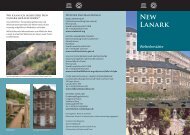
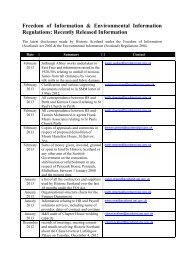
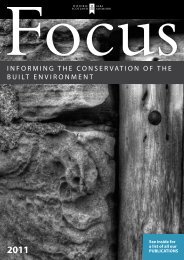
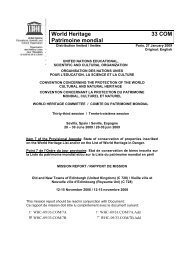
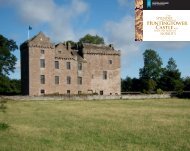
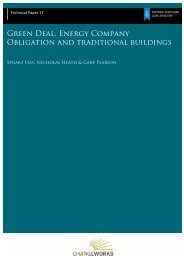
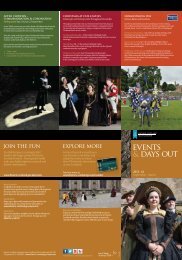
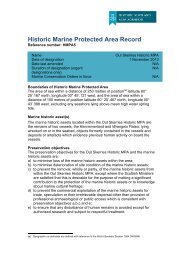
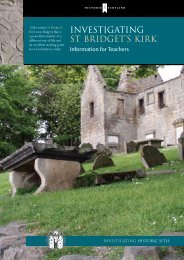
![Elgin Cathedral Wedding Brochure [pdf, 544kb] - Historic Scotland](https://img.yumpu.com/22301571/1/190x151/elgin-cathedral-wedding-brochure-pdf-544kb-historic-scotland.jpg?quality=85)

